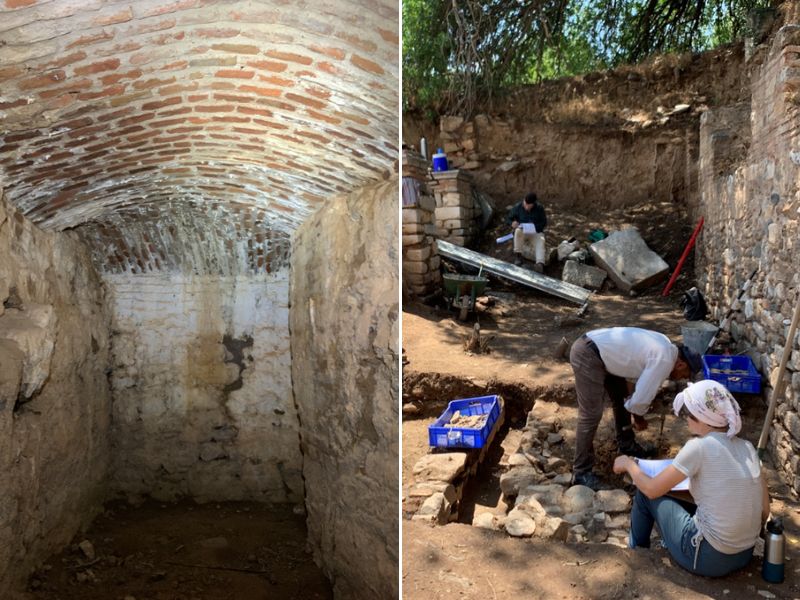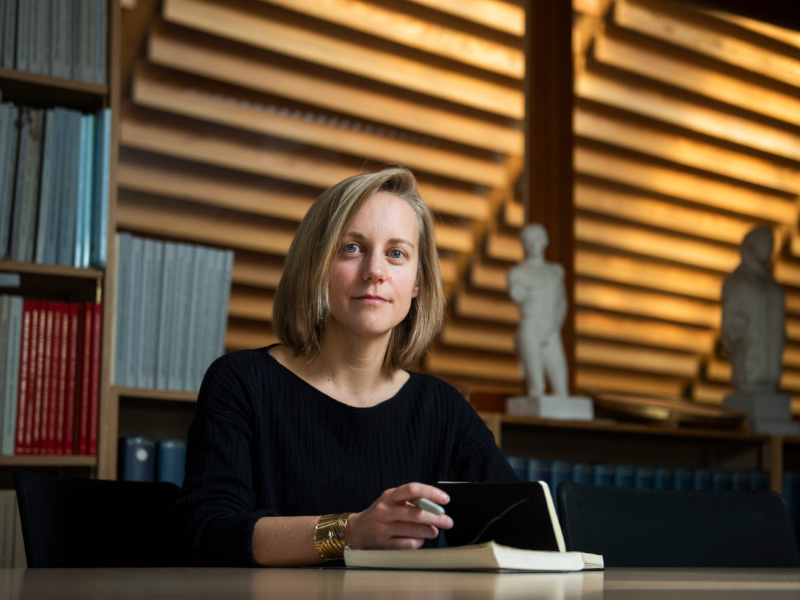With support from the Stavros Niarchos Foundation (SNF), Dr Ine Jacobs is digging into the history of an empire that sat at the crossroads of Europe, Asia and Africa for over a millennium.
Archaeologist Dr Ine Jacobs made a stunning discovery this summer at Aphrodisias, the site of an ancient city in southwest Turkey. She was leading excavations on a residential area, known to have burned down around 615AD, when she came across the cave-like entrance to an underground tunnel. ‘It had a spectacular feeling to go inside, a very Indiana Jones feeling,’ recalls the late antique (c.250-c.750) and Byzantine (c.330-c.1453) specialist.
The tunnel was part of a pagan sanctuary that also incorporated several rooms, big enough for perhaps 30 or 40 people to worship and perform rituals in. Within them Dr Jacobs and her team found bronze lamps, incense burners and small-scale statues of pagan gods, including several of the Anatolian mother goddess Cybele, to whom the sanctuary was likely dedicated. ‘One in particular is beautifully preserved,’ Dr Jacobs says, ‘she still even has gold on her helmet and in her hair.’
There was more excitement to come: the sanctuary, they realised, had been fully functional when the area surrounding it had burned down. ‘For the Byzantine world, that is a truly amazing discovery because we are supposed to be in the period of Christianity at this point,’ explains Dr Jacobs. ‘By the late fourth century, the rulers of the Byzantine Empire were making Christianity a state religion and starting to outlaw any kind of pagan religion, so it’s always assumed that by the time you arrive in the year 500 or 550, there are no more pagan cults. What we found disproves all of that.’

Conducting fieldwork – with its potential to yield discoveries that could rewrite our understanding of history – is a highlight of Dr Jacobs’ job. The Stavros Niarchos Foundation Associate Professor of Byzantine Archaeology and Visual Culture spends two months each year at Aphrodisias, advancing her research into the lives of ordinary people from the Byzantine period: ‘what they were doing, what they were seeing and experiencing, who they placed their trust in.’
Dr Jacobs also uses her time at the site, which coincides with Oxford’s summer break, to provide students with fieldwork training. ‘We can’t teach them how to excavate in a lecture theatre,’ she says. ‘It’s like teaching somebody how to install electricity from a book; it’s a skillset you have to learn in the field.’ The work can be tough – long days, intense heat, at times highly pressurised – but for those who persevere it can be a very special experience. ‘Almost all of them want to return afterwards,’ she says.
During term time Dr Jacobs teaches Byzantine archaeology and visual culture to undergraduate and graduate students. ‘I think Oxford for Byzantine studies is extremely strong because it is so interdisciplinary,’ she says. ‘We will pick up on what our colleagues are teaching, so I will present the physical history of a battle that is being discussed in another class, or my colleague who deals with inscriptions will talk about a building that I then present the artworks from. We are a very good interdisciplinary team that you would struggle to find anywhere else.’
I'm adding a layer of materiality to other subjects in the Byzantine world that is absolutely essential to really understand the past and to learn from itDr Ine Jacobs
Looking at people’s lives in the round is crucial to our understanding of the period, says Dr Jacobs. ‘Very often you end up with subjects that are taught almost in a void, whereas these people were like you and me. I don't think that you can understand the way they talk about their gods, for instance, unless you understand the buildings in which they came together to worship in, unless you understand how they used their lamps to light particular icons, or how they built their buildings to catch the morning sunlight. I think I'm adding a layer of materiality to other subjects in the Byzantine world that is absolutely essential to really understand the past and to learn from it.’
Alongside teaching and her own research, Dr Jacobs also serves as the Director of the Manar al-Athar digital archive, which provides high-resolution images of Near East and North African archaeological sites, buildings and art. The archive is a rich resource for scholars and students and its reputation is such that Dr Jacobs is regularly approached with donations of photographic material. Her team is currently working to add a collection of over 10,000 photographs of the Turkish region of Cappadocia, described by Dr Jacobs as being ‘essential for the Byzantine world’.
Through the Manar al-Athar archive, Dr Jacobs is also able to offer a range of learning and outreach opportunities to current and prospective students, including Oxford’s UNIQ+ research internships for talented undergraduates from under-represented groups. ‘You spend six weeks with the students so can give them in-depth training,’ Dr Jacobs explains. ‘I think the last UNIQ+ group we had, two out of the six applied for a master’s at Oxford. It’s really nice that we can have that impact, not just teaching them new skills but teaching them that this is for them as well. That’s the biggest achievement, I think.’

The work that Dr Jacobs is doing at Oxford, both to advance Byzantine studies and to train the next generation of historians, classicists and archaeologists, would not be possible without generous support from the Stavros Niarchos Foundation (SNF). In 2019 the foundation made a major grant to Oxford, endowing both the associate professorship that Dr Jacobs holds and the prestigious Bywater and Sotheby Professorship of Byzantine and Modern Greek Language and Literature. The grant also supported the Oxford Centre for Byzantine Research.
The foundation’s championing of Byzantine studies and the humanities more broadly at Oxford is particularly crucial in the current climate, says Dr Jacobs. ‘Humanities isn’t doing all that well. We’re very focused on economic gain and let’s face it, that’s not what we’re about; we’re here for general wellbeing and ‘being human’. Knowing that that financial security is there for the future is absolutely essential.’
Speaking of the future, Dr Jacobs is excited to tap into the network that SNF has built around Byzantine studies across the world. ‘I think there’s great potential there,’ she says.